Why are LGBTQ+ travelers flocking to these South Pacific islands?
Three islands are better than one! GayCities heads to French Polynesia to discover the best sites, Insta-worthy hotels & LGBTQ+ entrepreneurs.
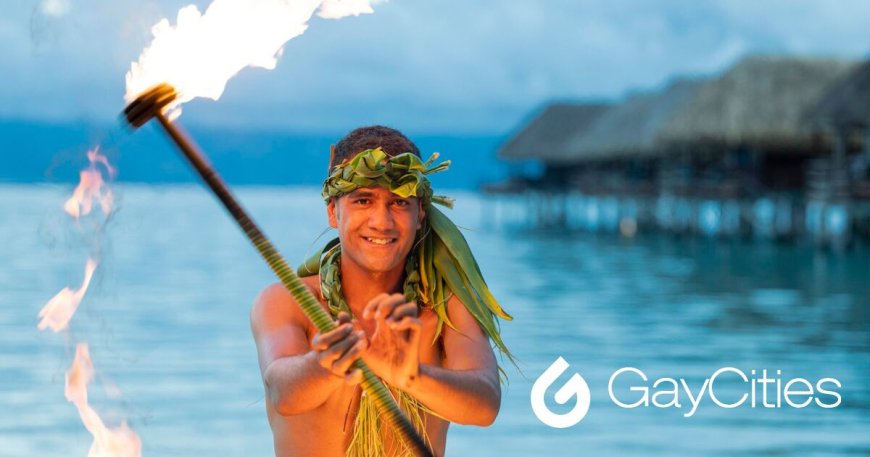
It’s not just blue. It’s not turquoise. It’s not lapis. Could it actually be cerulean?
I could’ve used Miranda Priestly’s help describing the ocean shades below as my initial flight descended on The Islands of Tahiti. I may not be a connoisseur of color, but I’ve traveled to a lot of beautiful places, and I’ve never seen more stunning swaths in any other sea.
The 118 islands that comprise French Polynesia, commonly called The Islands of Tahiti, share all those shades of the South Pacific Ocean and cultural characteristics that unite the region. And yet, each island within French Polynesia has unique aspects, including diverse topography, traditional dances, and seven different Austronesian languages spoken throughout the archipelagos, with French as the country’s official language.
From the moment I stepped off the plane in Papeete, the capital city, a wave of warmth welcomed me to the islands — and it wasn’t just the tropical weather. Traditional musicians and dancers performed as I proceeded through customs and received a garland of fresh flowers. American airports could learn a thing or two from Tahitian hospitality.
Pack your bags, we’re going on an adventure
Subscribe to our weekly newsletter for the best LGBTQ+ travel guides, stories, and more.
Subscribe to our Newsletter today
I visited three islands: Tahiti, Rangiroa, and Taha’a. The welcome was replicated at every regional airport, excursion, and hotel. I don’t know what the country spends on gifting fresh flowers, but I can assure you that starting each chapter of my vacation with a welcoming ceremony felt priceless.
Beyond the garlands, I watched expert surfers tackle the same waves that hosted the surfing competitions of the Paris 2024 Olympics in Tahiti, snorkeled among 1,100 species of fish in Rangiroa, and began each morning with a dip in the private “backyard” of my overwater bungalow in Taha’a. Along the way, I learned about Polynesian traditions of gender fluidity and how that history is evolving into a modern LGBTQ+ culture.
Related
Beautiful beaches for a romantic rendezvous
Roam the tranquil Caribbean dunes with your soulmate or look for love along the glimmering coastline of Greece.
A culture beyond the binary
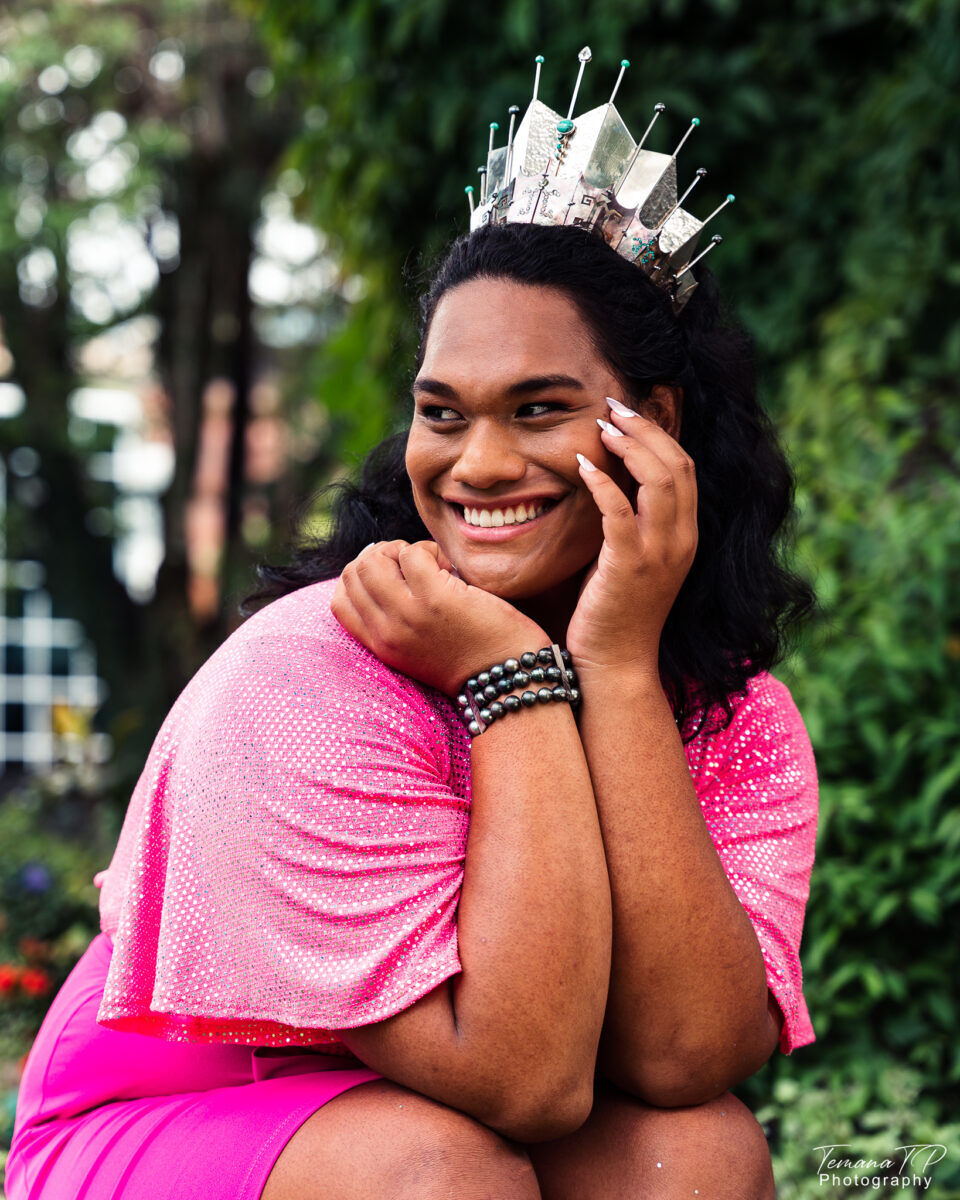
The Islands of Tahiti have a history of embracing a third gender known as māhū, a word that translated from Tahitian means “in the middle.”
Tahiti Tourisme describes māhū as individuals who “embody both male and female qualities, blurring the lines between traditional gender roles.”
Before the arrival of missionaries in the 18th century, māhū were revered as culture keepers. Today, though French Polynesia continues to be very religious, māhū are still active in teaching traditional music and dances. And that queer legacy has informed a culture more open to trans Tahitians and those living beyond the gender binary, though not always without its challenges.
Abel Hauata was the first trans winner of the Miss Université de Tahiti pageant in 2022. “I am very lucky. My gender has never been a problem — not for work, not for school. In general, we are free to live our identity and our reality here. Though I know for other transgender women it can be difficult,” she tells GayCities.
She also describes a smooth path to winning the title. However, the morning after the pageant, social media was neither kind nor supportive. Apparently, internet trolls exist in all geographical regions.
Abel, who identifies as a woman, also mentioned that though māhū is part of Polynesian culture, most young people no longer use the term to self-identify.
During my trip, I encountered trans and non-binary people in each of the islands I visited, which is pretty astounding for a country of 303,000 inhabitants spread out in an area the size of Europe. That’s less than the population of Pittsburgh!
Related
What’s it like traveling the world as a nomadic trans couple?
GayCities talks with trans nomads Erick and Sujay about trans traveling and their favorite destinations across the globe.
Reimagining Pride
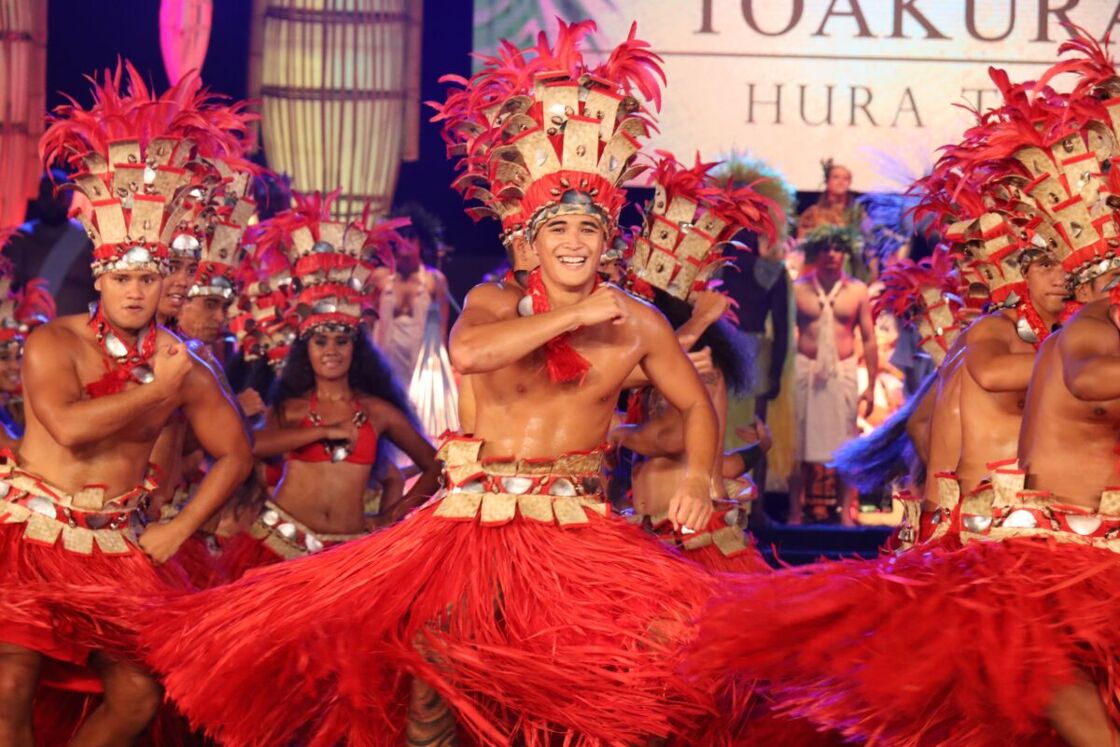
How does all this translate into the current LGBTQ+ state of affairs?
French Polynesia is a semi-autonomous territory within the collectivity of France and has a perfect score of 100 on Equaldex’s Equality Index, a marker of LGBTQ+ rights, laws, and freedoms, and legalized same-sex marriage in 2013. So, the destination is extremely safe for LGBTQ+ visitors.
In 2023 and 2024, the country celebrated the first two iterations of Tahiti Pride. Next year, under new leadership, Pride is getting a glow-up.
Steeve Liu, a Tahitian entrepreneur who, along with his husband, owns several bars and restaurants on the island, envisions incorporating Pride into a month-long celebration of LGBTQ+-welcoming events in October 2025.
Mark your beefcake calendars! Liu plans to kick off the month with Mister Tahiti, a pageant that celebrates male beauty and Polynesian culture. Though most contestants have traditionally been straight, Steeve insists Mister Tahiti is for everybody and welcoming to all audiences. He purchased the pageant, which has a decades-long history, three years ago.
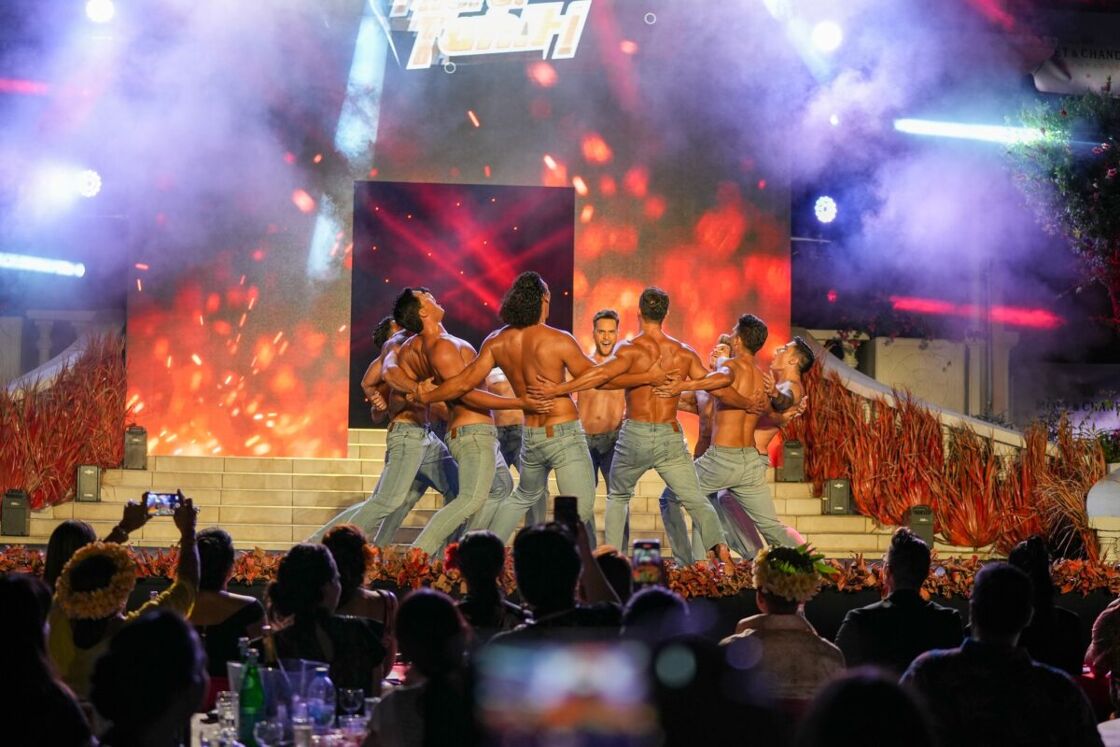
“Beauty pageants are a serious thing in Tahiti. And the most famous are Miss and Mister Tahiti,” says Christopher Prenat, a Mister Tahiti 2022 contestant who is openly gay. “Every time you have a family member or friend running for the crown, the whole island is there to support you.”
An actor born and raised in Tahiti, he’d coached contestants and worked on their costume design in previous years. By 2022, he was ready for his moment in the spotlight. “I was so proud of showing the beauty of my Polynesian culture. And we were very respectful and supportive of each other. We all actually became really close friends. Like brothers.”
The second week in October will be LGBTQ+ Pride. Liu, who is also the first LGBTQ+ president of the Chamber of Commerce for French Polynesia, plans to invite local businesses to share in the celebration. He envisions a festival running throughout the city, with parties hosted at bars, restaurants, museums, and beaches. Eventually, plans will include a Pride parade. “Tahitian people are very welcoming but shy and not very open about their sexuality. So, we have to work on that,” says Liu.
Liu’s approach to inclusivity is more quietly incremental than super-charged. “You have to work with people and understand the culture — their brain, their heart, the education that we’ve had in Tahiti. It’s better if we all work together because the mentality is definitely changing, and people are becoming more open.”
Beyond parties, Liu also plans to integrate events fostering education, emotional and physical health, and community outreach.
The last two weeks of October 2025 will feature Carnival Week and Tahiti Fashion Week.
Though there are no LGBTQ+-specific bars in Tahiti, everyone from our community recommended Malabar in Papeete. A restaurant by day and bustling bar by night, Malabar (owned by Liu) was packed when I visited on a Friday night. The crowd was mixed, with straight guests mingling with all of us on the queer spectrum. It had a vibe with music ranging from Euro-pop to Tahitian remixes to popular dance songs. Apparently, queer Tahitians love Britney Spears, too!
Related
Finding power in (small) numbers at St. Croix Pride
Queer people swim in all directions, a combustion of color and layered history – except for once a year when we fall in line worldwide.
A new vision for LGBTQ+ tourism in French Polynesia
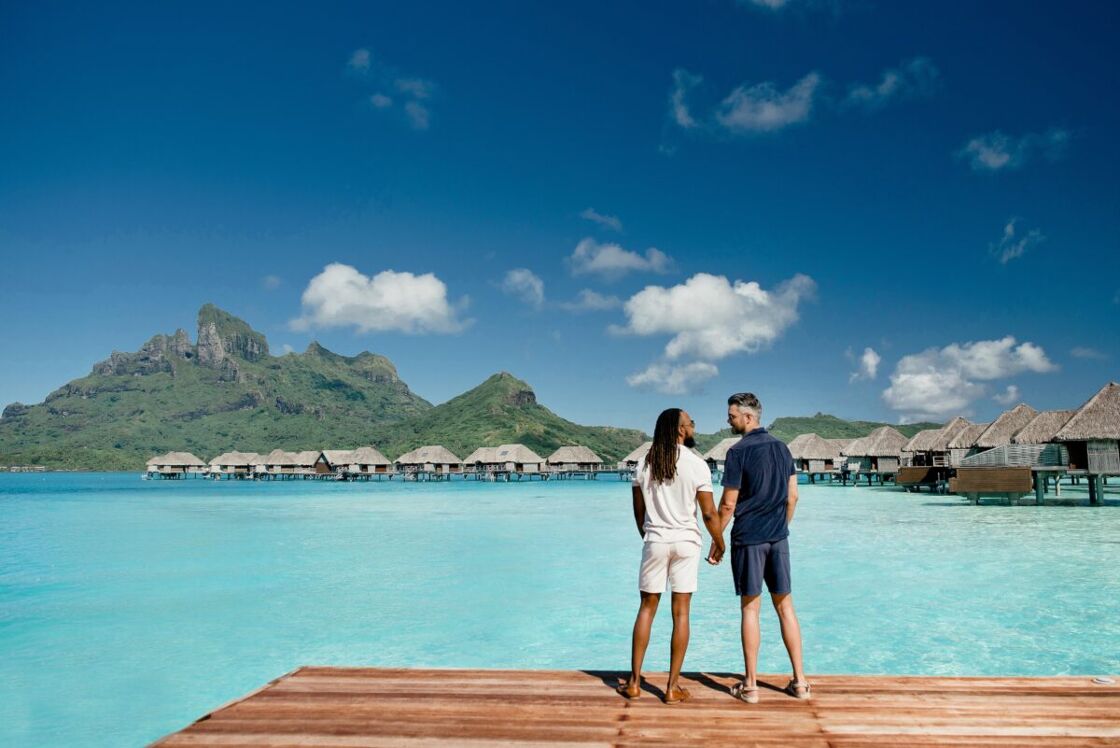
According to Liu, Moetai Brotherson, the new President of French Polynesia elected in 2023, and Jean-Marc Mocellin, the CEO of Tahiti Tourisme (who is gay), have set goals to welcome our community and increase LGBTQ+ tourism to the islands.
In November 2023, French Polynesia hosted government officials, thought leaders, and human rights defenders in its first forum dedicated to advancing LGBTQ+ rights and inclusivity across the Pacific. As 84% of the Polynesian population identifies as Protestant or Catholic, one of the goals to emerge from the forum was “emphasizing our shared responsibility to ensure that religion and tradition are never used to justify discrimination … against LGBTQIA+ people.”
Government goals align with Liu’s plan for more LGBTQ+ visibility: little steps toward big goals.
For years, The Islands of Tahiti have been a favorite honeymoon destination. Now, the country is dedicated to welcoming LGBTQ+ travelers who want to go beyond romantic escapes and explore the country’s cultural diversity and natural beauty. With the expansion of Pride, it’s hoping to not only welcome more LGBTQ+ visitors but also create a more vibrant and accepting society for its residents.
“People come to Tahiti for an exclusive experience. Because you don’t want to be with two million people in the same place,” says Liu. “But we are now also building the foundation so we can continue to be a more inclusive experience. And we’ll be ready to welcome the community with the events and programming that they want.”
Surpassing a fast-fling spark, it looks like The Islands of Tahiti are ready for a long-term LGBTQ+ relationship.
Plan your French Polynesia getaway
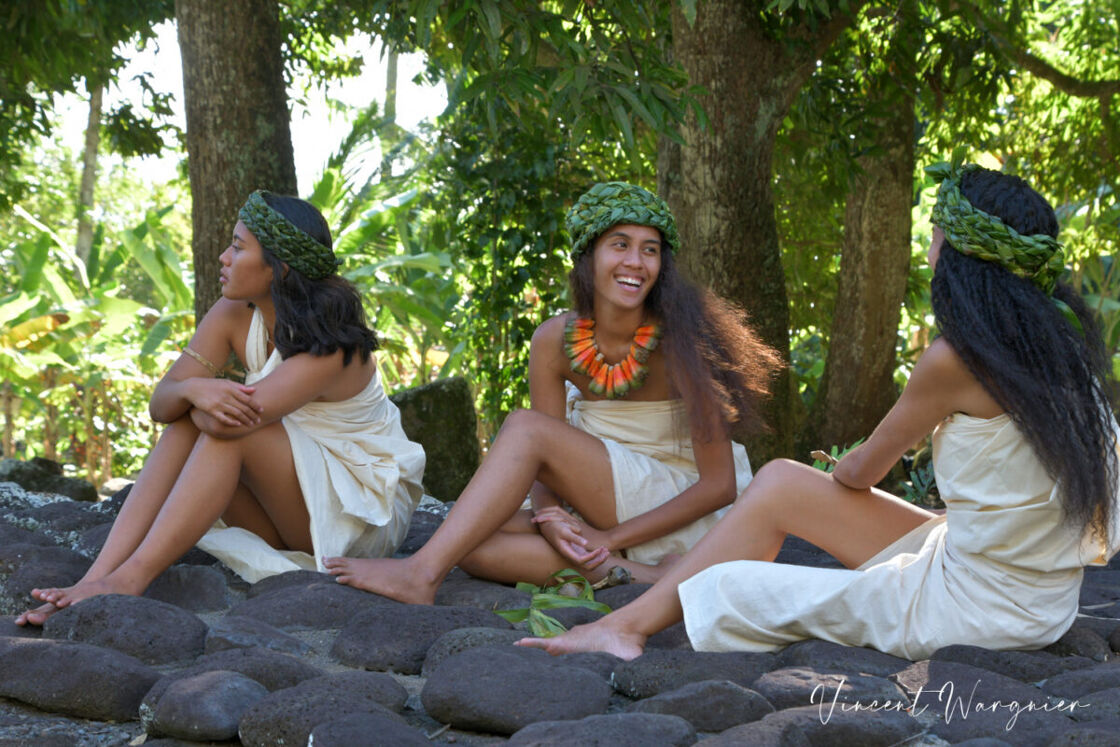
Tahiti
Tahiti is the most populous island and home to Papeete, the country’s capital, and Tahiti-Faa’a International Airport (an eight-hour flight from Los Angeles). It’s the perfect surf and turf for adventure lovers with Teahupoo, the world-famous surf break, and a lush mountainous interior for hiking and waterfalls. Papeete is also the best place to explore nightlife, as other islands are more resort-oriented.
Hotel Hilton Tahiti — Located five minutes from the airport and Papeete nightlife, the Hilton has a huge pool and beautiful ocean views. Stop at the bar for drinks, whether staying here or not.
Le Tahiti by Pearl Resorts — A luxury resort on a volcanic black sand beach with various room categories. Plan your stay around their Marquesan-Polynesian show on Thursday nights.
Teahupoo Tahiti Surfari — Advanced surfers can tackle Olympic-sized waves. The rest of us can join the tour operator’s Vaiau Adventure Tour to Fenua Aihere, a portion of the island accessible only by boat. Swim through underwater coral tunnels, hike through forests to reach a hidden waterfall, and swing off trees where a mountain stream meets the ocean.
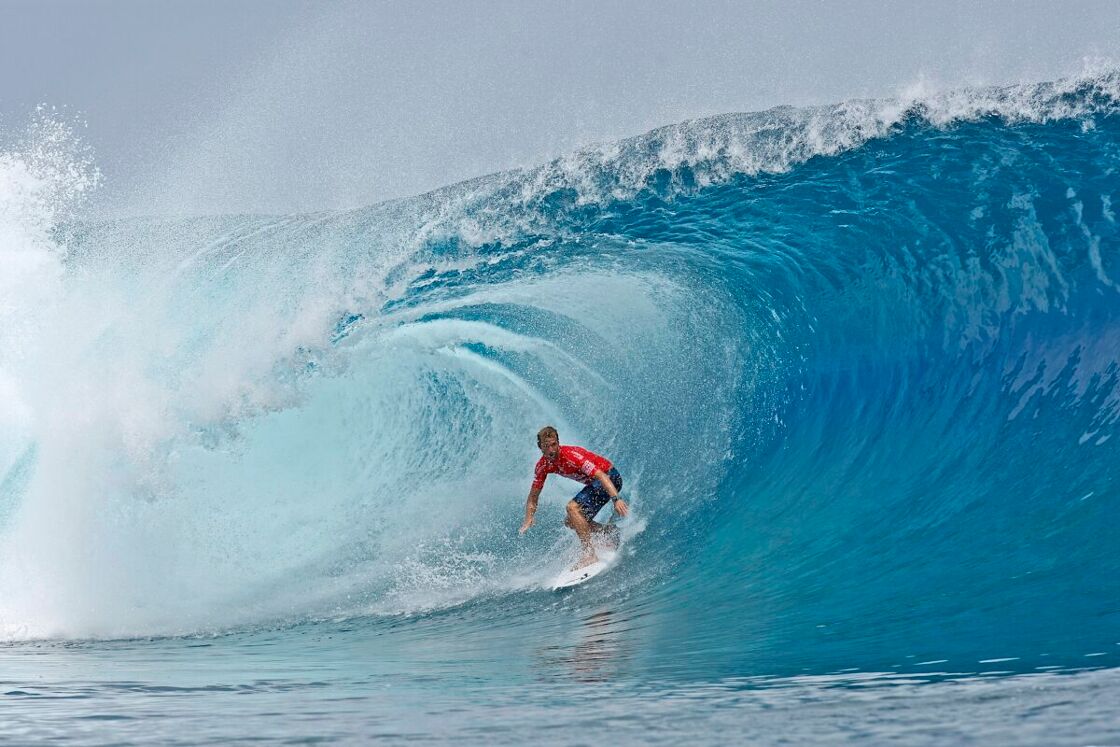
Papeete Market — This is your best bet for all your shopping, from fresh food to souvenirs to exquisite pearl jewelry. Stop for lunch at Maeva Cafe on the second level.
Malabar — A casual restaurant becomes the best LGBTQ+-friendly nightlife spot in Papeete, with karaoke nights and DJ/dancing on the weekends.
Reeftop — A rooftop bar and restaurant on the 8th floor of the Kon Tiki Hotel, with 360-degree views of Papeete. LGBTQ+-friendly and very popular around sunset.
Rangiroa
From your Rangiroa base (less than a one-hour flight from Tahiti), you can explore beautiful seascapes with some of the clearest water you’ve ever seen, like the Blue Lagoon and Tiputa Pass, both overflowing with marine life. Wine lovers can also visit Tahiti’s only vineyard and tasting room.
Kaimana Excursions — Spend a day at sea with all types of marine life. Swim and walk among sharks in the Blue Lagoon’s two-foot-deep water. Here, you’ll also claim an uninhabited island as your base for the day, including a meal of freshly caught fish. The day ends with visits to the Rangiroa aquarium, an “aquarium” utilizing an open ocean coral garden near the Tiputa Pass.
Vin de Tahiti — Curious what wine made from grapes grown on coral-rich soil tastes like? Vin de Tahiti is the country’s only wine producer, with a tasting room in Rangiroa.
Kia Ora Resort & Spa — The largest resort in Rangiroa with both on-land and over-water bungalows.
Motu Fara — Stay in a villa on a private island just a short boat ride from the Rangiroa mainland. If that extravagance is outside your budget, make a reservation for an intimate dinner on the overwater deck, curated by a private chef.
Le Relais de Josephine — A family-run guest house with seven bungalows. Stop by for an al-fresco lunch overlooking the water.
Taha’a
In Taha’a, you can indulge in your version of Fantasy Island. To reach Le Taha’a by Pearl Resorts, you fly into sister island Raiatea and board a private boat that whisks you from the airport to the five-star luxury resort. Regardless of whether you’re traveling solo, with a romantic partner, or with a group of friends, you can’t visit The Islands of Tahiti and not have an overwater bungalow experience. (The concept was created here.) Taha’a is also the biggest producer of Tahitian vanilla, so leave some time to explore a vanilla plantation in one of the island’s lush valleys.
Le Taha’a by Pearl Resorts — A five-star luxury resort with 58 villas, many as overwater bungalows. The resort sits on the edge of a coral garden with amazing snorkeling.
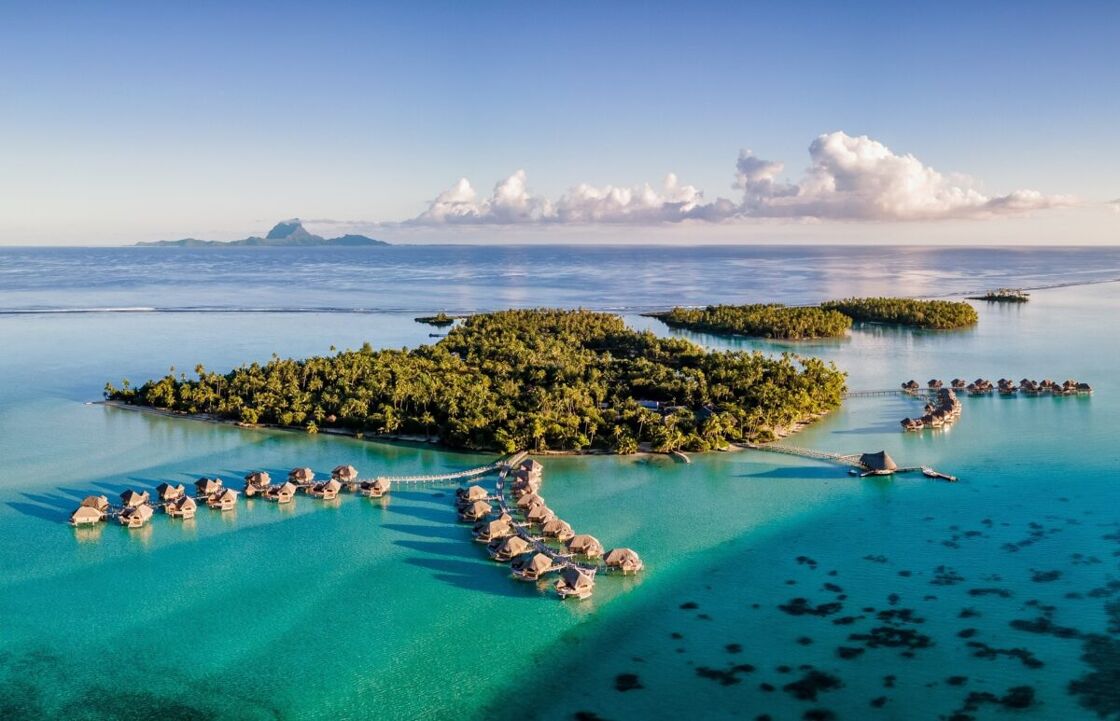
Aro Ma’ohi Tours — Explore Taha’a on a 4×4 jeep, visiting a pearl farm, vanilla plantation, and rum distillery.
Poerani Tours—Customize a day on land or water with fishing, snorkeling, jet skiing, or a jeep safari. Regardless of the tour, book your lunch at the home of Poerani’s owners, Linda and Teva, for a home-cooked feast on their terrace.
Domaine Pari Pari Distillery — Stop by for a tasting and tour at one of the few factories that produce local rum. Standard tasting is complimentary, but you’ll need cash for additional samplings.
Dream Yacht Charters — Book a private catamaran charter (minimum three days) and explore the waters off Taha’a and Raiatea. You can rent the entire boat or just one room.
Ready to discover more? Visit GayCities’ Guide to French Polynesia with even more recommendations for hotels, bars, restaurants, shops, and beaches.

 Mark
Mark 





